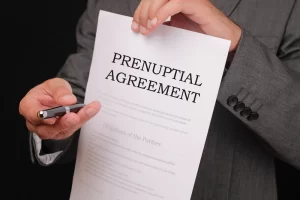WHY MARRYING COUPLES NEED PRENUPTIAL AGREEMENTS
People often have the mistaken idea that prenups are only for the wealthy, but that is not true. Large numbers of brides-to-be and grooms-to-be want the certainty that they can get from a prenuptial agreement or “prenup,” and they come from all different financial circumstances. There are many, many reasons why marrying couples need prenuptial agreements, and some may surprise you.
Among the most common reasons:
- Protect your premarital property – if one party has specific property or monies prior to the marriage, a prenup can prevent dividing the premarital property, in particular the increase in value of that property during the marriage. Although the premarital property itself is typically not divisible under Hawaii divorce laws, things that are acquired during the marriage are divided in a divorce. This includes an increase in the value of the premarital property. In some instances during a long marriage, the increase in value (divisible) may exceed owning spouse’s premarital value (not divisible) portion! A prenup can specify that both the premarital property and any increases to that property are kept separate.
 Protect or separate your inheritance or family money – some prenuptial agreements are requested by parents and other family members in order to protect property that one party has inherited from his/her family, or will inherit in the future. Similar to premarital property discussed above, a spouse receiving an inheritance or gift typically keeps the date of receipt value if the couple divorces. However, just as with premarital property, the increase in value on the inheritance/gift is divisible in a divorce. A valid prenuptial agreement can lay out that the gift or inheritance property, including any increases in value stays with the recipient in a divorce.
Protect or separate your inheritance or family money – some prenuptial agreements are requested by parents and other family members in order to protect property that one party has inherited from his/her family, or will inherit in the future. Similar to premarital property discussed above, a spouse receiving an inheritance or gift typically keeps the date of receipt value if the couple divorces. However, just as with premarital property, the increase in value on the inheritance/gift is divisible in a divorce. A valid prenuptial agreement can lay out that the gift or inheritance property, including any increases in value stays with the recipient in a divorce.
- Eliminate or define alimony – prenups can have a wide range of alimony options, from providing that NO alimony be awarded in a divorce, to specifying a set amount of alimony. This is typically a concern where one of the parties’ income is significantly greater than the other party. Hawaii has no formula for alimony. Instead, Hawaii law has a list of factors that a court would consider in determining alimony, people are understandably concerned about the uncertainty of alimony. Will there be alimony? A huge number? A tiny number? For some, the ability to fix alimony: (1) will there by alimony; (2) how much; and (3) how long – by either a set number or a set formula can be a very appealing part of a prenuptial agreement.
- Support your estate planning – this might include leaving specific monies or gifts to children from a previous relationship, or to one’s parents. Unknown to most people, a spouse in Hawaii and in most states has rights to claim from their deceased spouse’s estate, typically called an elective share, because of their marriage – this may override part or all of the deceased person’s will or trust. Typically, a prenuptial agreement will include a waiver of that elective share right by both parties, making it such that each person’s will/trust/estate plan controls what happens to their assets in case of death.

Define specifically what is “marital” property and what is “separate” property – beyond premarital assets and gift/inheritance assets, a prenup can allow people to determine how they want future acquired property to be handled – whether they want to have it split equally, divided by proportion of contribution, or held and owned separately. This kind of certainty is what many seek when having a prenup prepared.
- Figuring out what would happen to a business – many business owners seek prenuptial agreements to ensure that they can keep their premarital business in a divorce. A common problem in divorces involving self-employed spouses is valuing their business. A professional business valuation, conducted by a forensic accountant or other business valuator can be very expensive and time-consuming. In addition, many small business owners are reluctant to open up their books for attorneys, judges, accountants, and potentially the public to see
- Establish procedures/rules for deciding future matters – some couples utilize prenuptial agreements to spell out how their finances will be handled during marriage, including how regular expenses are paid, managing debt, saving for retirement, among others. For example, some couples will draw up a financial plans where each party deposits a certain amount of each paycheck into a joint account, from which certain specific bills will be paid – housing, utilities, etc. Other couples wish to insert procedures before either spouse makes a purchase over a specified amount.
- Reduce conflict/fighting in the event of a divorce – as any divorce lawyer will tell you (including us), a contested divorce is a very costly and stressful process. A properly drafted prenup can avoid that messiness, saving thousands or even tens of thousands of dollars in legal fees. This reason is one of the most common (and common sense!) reasons for seeking a prenuptial agreement.
Conversely, there are a few of reasons for which people don’t need a prenuptial agreement:

Date of marriage value of premarital assets: protecting the value of your premarital property as of the date of marriage – even without a prenuptial agreement, in a divorce each party is entitled to the date of marriage value of their premarital property (having a prenup however, serves to protect the increase in value of those premarital assets).
- Child custody and visitation: deciding child custody – a prenup cannot validly bind people to a child custody or visitation arrangement. This is generally because any custody/visitation award in a divorce needs to be approved by a judge as being in the child’s best interests. Additionally for those couples planning to have children in the future, the court would understandably not enforce an agreement as to future children.
- Child support: as child support needs to be based upon current financial circumstances of the parents, a prenup agreement as to child support made sometime in the past would not be viewed as binding.
There are many more examples on both sides of the equation, as each couple’s specific situation is different. It is clear however, that prenuptial agreements provide future married couples a tool to help them seriously plan for their future. Prenups give couples an amount of predictability and certainty if things do not go as planned.
Doi/Luke, Islandlawyers has handled significant numbers of prenuptial agreements over the years, in sizes big and small, complex and simple. To discuss options that might fit your needs, call them at (808) 593-2199, or e-mail them at office@islandlawyers.com. They’ll be happy to speak with you about your options.
FURTHER READING ON PRENUPTIAL AGREEMENTS:
Prenuptial Agreements in Hawaii



